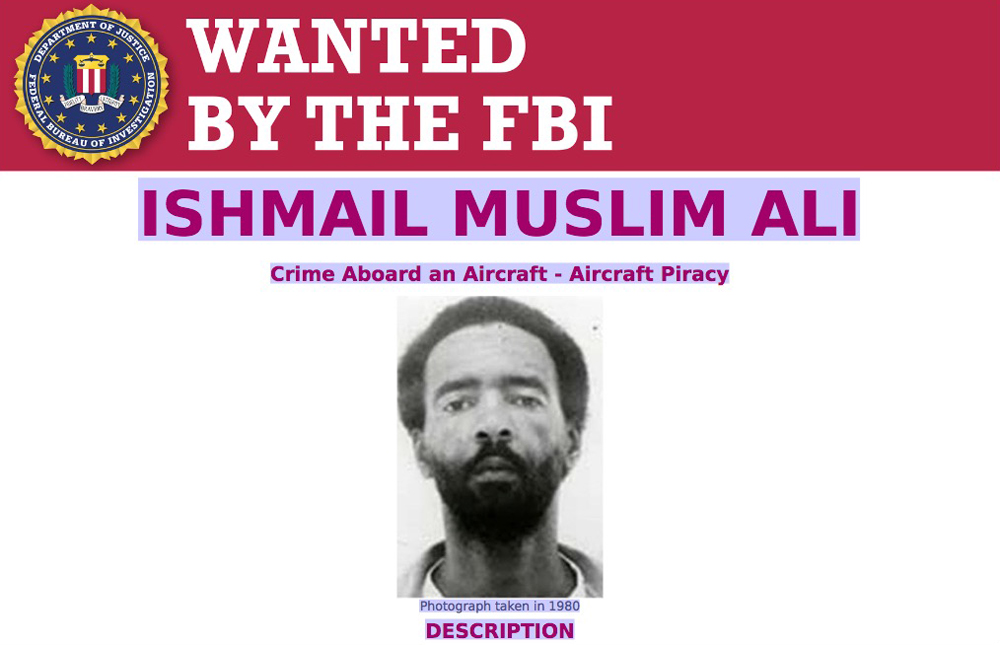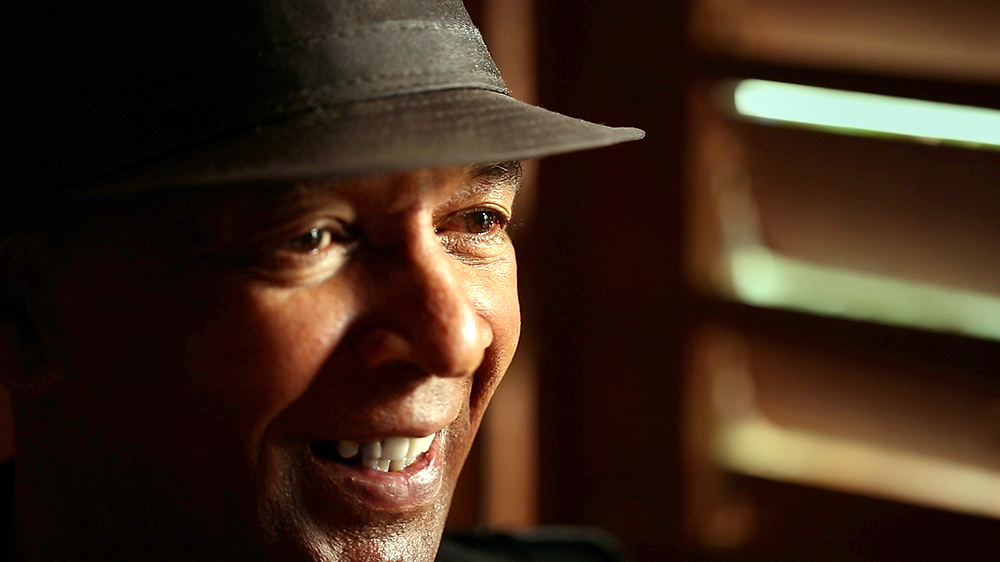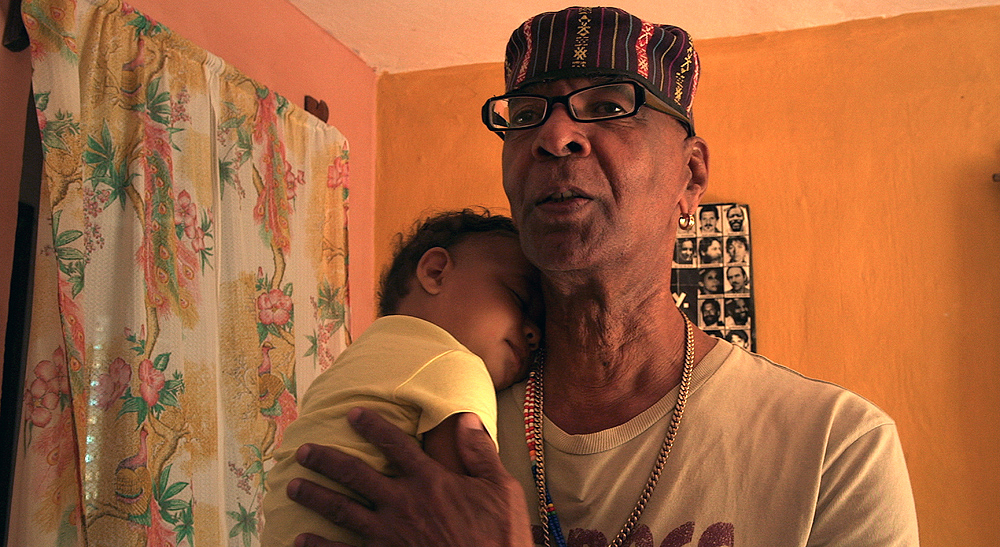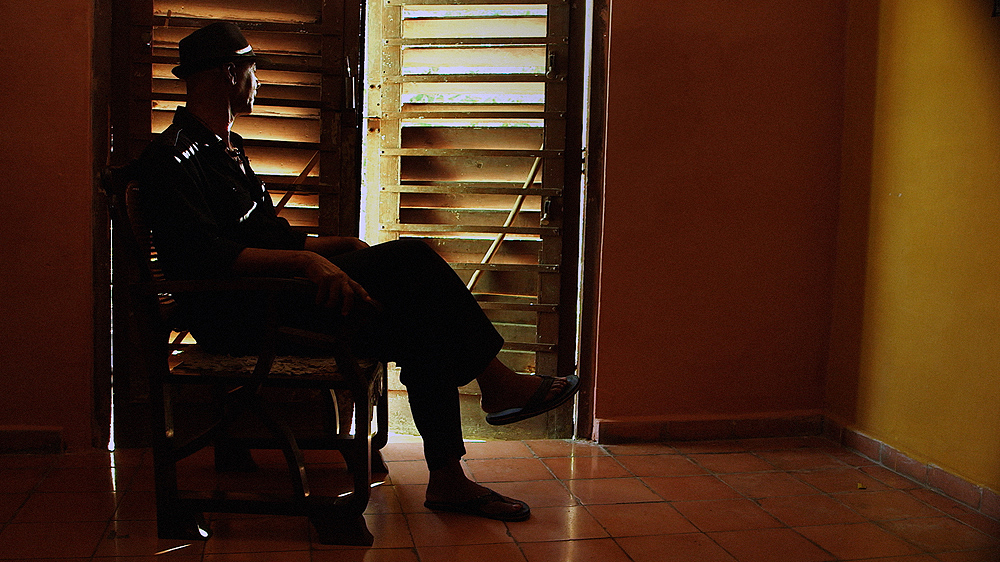Pictures Courtesy Strand Releasing
Bravura story telling by Canadian Director Jamie Kastner about Ishmael Muslim Ali, one of four men convicted of murdering eight people at a swank golf course in St. Croix , U.S. Virgin Islands, 1972, and who 12 years later hijacked an American Airlines passenger jet to Cuba where, after a short stay in an island prison, was granted political asylum.
The mass murder was widely portrayed as an attack by black Virgin Islanders against innocent whites. Along comes Canadian Director Jamie Kastner more than 45 years later with a fact-based documentary rooted in solid investigative journalism that exposes egregious flaws in the official record and account of the murders, the police investigation and criminal prosecution. It also shines a klieg light on the political and social injustices as well as corruption and praetorian elitism in St. Croix during the 70s and how those factors were reflected in the criminal justice system that prosecuted Ishmael Muslim Ali and his co-defendants. The film’s symphonic and kaleidoscopic sweep exposes the primal engines of institutional and systemic racism and bigotry that were pillars of St. Croix society and that often are overlooked if not ignored or camouflaged in Western societies.
There are, of course, the interviews of Ishmael Muslim Ali, now a respected Cuban resident who has raised a family. He is still on the FBI’s most wanted list. Joanne Chesimard, also known as the revolutionary Assata Shakur, a former member of the Black Liberation Army who was convicted of the 1977 murder of a New Jersey State trooper, and who had been granted political asylum, vouched for his asylum. In the film, he exudes an irresistible equanimity and candor and forthrightness. The juxtaposition of his interviews with those of several other sources interviewed for the movie – who consider his freedom an affront and still wish that he rot in hell – as well as the never ending streams of facts and research information by Kastner, especially about the socio-political conditions of St. Croix, is an eye opener, John, 8:32: Then you will know the truth, and the truth will set you free.
Graphics, animation, lush cinematography and a game symphonic film are also also features of the bravura story telling. This TALE is more than 40 years old but has the feel of a contemporary story, especially in light of the geopolitical changes by the Obama administration regarding America’s relationship with Cuba despite the Trump administration’s saber rattling. Vintage footage of that period many years ago adds authenticity to the brush strokes of historic patina for the film. In a phone interview, Kastner praised the research acumen of Elizabeth Klinch “who found a great trove of footage, including very obscure stuff of Fountain Valley, of the golf course, all sorts of stuff I never would have dreamed of.”
“I had a wonderful editor, Jorge Parra, a great cinematographer, Derek Rogers, who was nominated for a Canadian Screen Award for his work on this film. I really worked with top notch people. I had great researchers, it was a strong team,” he also said in the phone interview.
This movie soars on the same plane of excellence as THE CENTRAL PARK FIVE by Ken Burns, Sarah Burns and David McMahon, their cinematic documentary film revealing the institutional and systemic racism and bigotry of New York City’s criminal justice system at the core of the police investigation and prosecution of five innocent youths. The unconscionable news media savaging of the co-defendants in a case known as the Central Park Jogger Case, especially by the tabloids and local TV affiliates, is unforgettable and unforgivable. Sarah Burns wrote the book, “THE CENTRAL PARK FIVE, and the movie followed. Kastner’s TALE came about another way.
“I came to it cold and completely by accident through my car mechanic who had a friend in Cuba who had met Ishmael and gathered that Ismael was interested in telling his story,” Kastner said in the phone interview.
His earlier films, SECRET DISCO REVOLUTION and KIKE LIKE ME were satirical and idiosyncratic docs with black and subversive humor addressing issues of race and bigotry. A gay, black, female Mod Squad-style trio, swathed in disco-era sartorial chic, sashays frequently “like a sort of revolutionary Greek chorus” in several scenes of his THE SECRET DISCO REVOLUTION (2013), a “quasi-satirical documentary” about disco being a powerful liberation movement for women, blacks and gays. The filmmaker’s A KIKE LIKE ME (2007) was described in press information for its premier on the Sundance Channel as: “Provocative, mischievous” and impossible to dismiss regarding the antisemitism and hostility Jews faced around the world. Impossible to dismiss?
Kastner’s films are portals for audiences to dare to look at social and political issues that they can easily ignore in their day-to-day lives. He belongs to that coterie of filmmakers who don’t shy away from controversy and who have the cinematic savvy to open up the minds of audience members to social issues that every day life allow them to eschew.
THE SKYJACKER’S TALE, is a thriller flushed with irony and scenes, subtle, of subversive humor. Regarding THE SKYJACKER’S TALE, “I knew I had an incredible documentary character on my hands (Ishmael Muslim Ali), an incredible story full of injustice and mystery, racial elements and famous figures all involved in a huge story, an American story with global resonance of which few people were aware,” Kastner writes in his Press Notes (provided to reviewers and writers). “Then, as work on the film began, a seismic geo-political shift, the thaw in Cuba-US relations, and suddenly Ishmael Muslim Ali (formerly LaBeet) and his story were at the center of current events again.”
In the phone interview, he said, “Seeing the remains of those old news stories from the time about – not only the hijacking –. and the coverage that existed up until that point, which was you know three, four years ago when I first found out about it, it was completely one-sided.”
“There were considerable challenges gathering the material, either because of political sensitivities [stemming from] two old cold war enemies [United States and Cuba], or unearthing people to speak about a notorious racially charged crime on a Caribbean Island 40 years after the fact,” Kastner said in the phone interview. Other challenges included dealing with death threats, taking perilous night trips with crack-addicted guides and countering interference “set against my gaining access to characters,” he said in the phone interview.
“An activist news letter from back in the day” reported that “Virgin Island brothers were being mistreated,” he said but it had flaws, such as being vague about facts. “And it was also hard to understand. When you’re coming in from the cold, about how this crime could possibly be a political act, and that is assuming that they did it (which he doesn’t believe and neither did this reviewer after seeing the movie twice). “And even from that if you got the impression that they were guilty, you definitely began to get the impression that there was something fishy that went on in this trial.”
“So once I was put in touch with him (Ishmael) and he agreed to meet with me I heard a whole other story, a completely different story about what went down and that was really the beginning of the journey for me. You see those efforts to reshape the narrative about what that crime was right from the get-go,” he said in the phone interview about the police investigation. “You go back and look at what happened and it was a bizarre murder and apparently a robbery gone wrong. [Yet] immediately it was portrayed as a race war by Black Virgin Islanders against these white people at this golf course, leaving aside certain facts, including the fact that one of the victims was Black. And, also the fact that when you go back and read the transcripts of this thing, there are layers and layers and layers of chicanery and mishandling that went on. The film goes into the most egregious examples of it but there is no shortage it.”
“There were witnesses who said these guys were speaking Spanish to one another when they were first interviewed at the pre-trial and then six months later changed their testimony and said they were speaking English and they were Black guys, but they were wearing masks. I mean, it stinks from end to end. The selection of the jurors was completely imbalanced. There was a sister-in-law of one of the police officers involved who got put on the jury. There was jury tampering that went on with the Deputy U.S. Marshals and FBI people threatening jury members family and in some cases the jurors themselves. There’s accounts of the lead juror, who was only 19 at the time, who signed an affidavit afterward saying he was pressured into changing his vote.”
“You get the impression of a deeply corrupt, racially and economically fraught situation down there where there’s no end of abuse and coercion. Also, shockingly enough, it feels like it was ripped out of last week’s newspaper when you read about what went on with the cops and these local Black kids.”
“This is quite different from my other work. I would say that my other work is all political in one way or another, but usually it has a comic, ironic tone,” he said in the phone call.
“My feeling is that to make anything you want to make, even if you have a political message, and I’m not sure that, insofar as my films have political messages, they’re buried, I believe that you have to make something entertaining first, otherwise I don’t believe people will give a shit about it. So I consider that my first job.”
His RECESSIONALIZE! FOR FUN AND PROFIT, is “a kind of comic, ironic film about things people were doing in the wake of the recession, and I’ve often made films where I’ve had to make up a plot out of nothing because movies do need plots,” he said. THE SKYJACKERS TALE “had four movies in one, you had a heist caper, you had a courtroom drama … and then there was this whole social story [race, racism, bigotry] at the heart of it, and not to mention the timeliness of one of the most wanted American fugitives in Cuba, who suddenly becomes kind of an inadvertent linchpin in jail political negotiations of the day.”
“It was extremely rich in this regard and the challenge was an opposite one to one I’ve had previously, which was how to choose which story to focus on, how to meet it as dramatically, and in a way that would not necessarily present easy answers because I’m not a fan of that, but how to make it engaging in a way that would make people reconsider the key characters and events and scenes and issues afresh for themselves.”
“In a documentary, I believe, you need a very strong character, just like in any movie, except in documentaries, because you’re not fabricating and manipulating it to the same extent as reality television, you really need people, characters who are strong enough, for real, very charismatic and he [Ishmael] is 150 percent charisma. Love him or loathe him, he is fascinating to watch and to listen to. He’s sexy. He’s funny. He’s scary. He’s very intelligent. I knew when I met him that he could carry a movie.”
Regarding what he described as Ishmael’s “off color, rascal kind of sensibility, I let that tone guide me in the recreation (of the plane hijacking), and insofar as the film wound up being structured by following alternative viewpoints, you’re getting his version of it, you’re getting his tale for awhile, then you’re getting the cops’ tale, then you’re getting the FBI guys’ tale. So I did allow … those different versions to guide the tones of the recreations that I set out to shoot.”
Kaster said in his phone interview that he wanted to recreate for the audience what he experienced emotionally and intellectually researching the movie. “I went through various processes. I went through the process of making the film myself of being taken by his story and then I would speak to other people on the other side of things who would also be making very compelling arguments and I’d start to question what I believed before and then something else would come up, and I’d question it again. And it became like a kind of intellectual, moral thriller, and I wanted to recreate that experience for the audience.”
“I tried to approach it with a certain standard of journalistic rigor. I always felt all along that if getting to that truth and the shocking revelation of this story would be most strongly effected by presenting as balanced an account as possible. That it didn’t feel like a one-sided activist piece of filmmaking, which is fine, there are some great works done in that genre, I respect it, but it’s not my mode and it’s not the mode I felt would work best for this story.”
“I thought I would increase the credibility of it for it to have journalistic rigor, for it to present [as many sides as possible]. “I don’t think I portray him like a saint, I think his detractors get plenty of platform in this film. I think that I present these things and I present him with his charm, his intelligence and his flaws and you hear his story and you hear the contradictory stories and you as the thinking audience member get to make up your mind about what’s right or wrong in this story. ”
Screenings
– Facets Cinematheque – Chicago, IL, Opens: Friday, July 28, 2017
– SIFF Cinema – Seattle, WA, Opens: Friday, August 4, 2017
– Caribbean Cinemas – St. Croix – St. Croix, USVI, Opens: Thursday, August 31, 2017
– Caribbean Cinemas – St. Thomas – St. Thomas, USVI, Opens: Thursday, August 31, 2017
Gregg Morris can be reached at gmorris@hunter.cuny.edu





